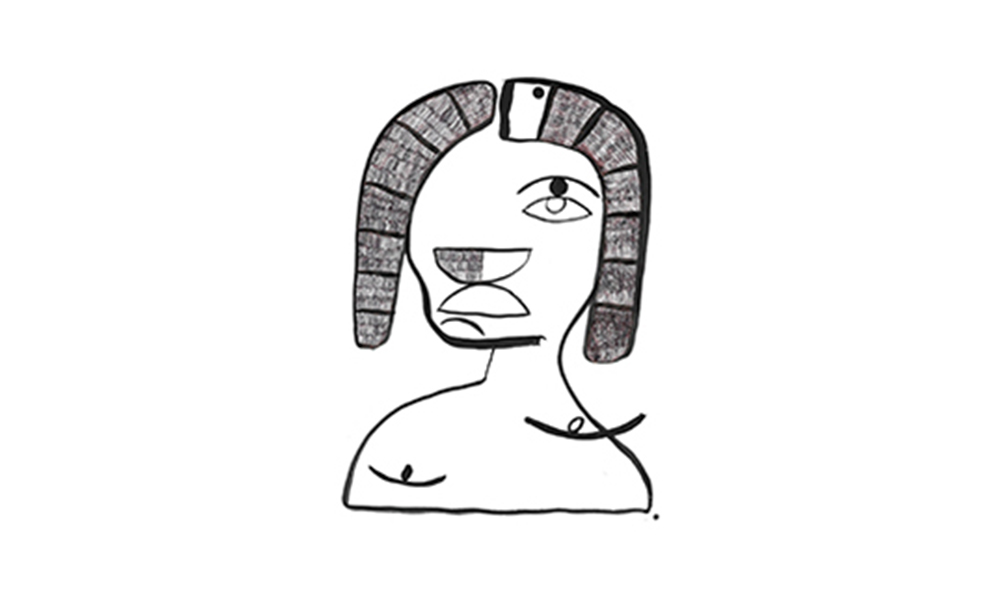Weeping Gang Bliss Void Yab-Yum introduces us to the poems of Devendra Banhart, the consummate “freak folk” troubadour. True to form, Banhart remains distinctly psychedelic, dynamic, and experimental on the page, never settling for a single style, a single subject, a single register.
Banhart’s poetry concerns itself with death and religion, love and loss, sheer silliness, and, in the end, existence itself. For every hint of the New Agey, there is a counterpoint of defamiliarized sound for sound’s sake. To a surprising and deliriously invigorating degree, the two elements cohere and reinforce each other. In the middle of the poem “Total Pink Cosmos / in Square White Cloud,” for instance, there is a two-line stanza, a punning double entendre, that holds a complex, koan-like key: “A wrong done, / dreamed a way.” Throughout the book, Banhart treads the line between sense and senselessness, but he never loses touch with the emotional truth of his experience. To give another example, part of a (possibly) untitled poem reads, “Like koi fish in a state-funded temple, // I gave all I had / instead of what / I had / to give.” The poem “Instrumental Music” is a single sentiment arranged circularly. What at first looks like a non sequitur suggested by rhyme soon reveals itself to be a pained existential statement leavened by absurdity. Turn it over in your mind, sing it without a tune: “Like an ex-con / at a nail salon // I’m hangin’ on / like an ex-con // at a nail salon. / I’m hangin’ on.”
Beyond employing white space in individual poems, Banhart uses it as a transitional texture in the book as a whole. The titles of the poems are denoted not by boldface but by capitalization or lineation. The subtle subversion of this formal convention means that a blank page here or there in the book could either be a break between poems, or a moment of silence within a poem. The effect both disrupts the reading process and intensifies it. One is forced to stop at odd intervals, but is also impelled to read all the way to the end. In addition, on one page in the center of the collection, dashes wrap around the corner, and on the other side are snippets of words, inserted perpendicularly; when the page is folded on the line, the words complete the poem.
With these formal obstacles in place, the reader may occasionally feel stymied. Certain moments may feel unearned. But it occurred to me that these were intentional poetic gestures of obfuscation, meant to wrench the reader free from her own expectations. The poem that opens the collection ends thus: “Human / night, brief / stay, brief / stay. // Soon, all gone. // It’s good luck to kill innumerable innocent people / and drive all manner of creature to extinction. // Once the earthquakes began, they never stopped. / & All else was just a 1000-year-old // Veggie // patty.” The first time I read this, it sounded simply absurd, simply silly. When I reread it after having read the entire collection, the sorrow came alive. What does it sound like when absurdity coexists with sorrow? It sounds like a mind in full.
In building that mind on the page, Banhart also provides a sort of ars poetica: “I know it is, and deep down I also know it isn’t, and then deeper down I / know it is, etc. / This is a kind of sanity, I think. // And I think you / understand. // I know you, / like me, / often feel // Like God’s abandoned / lunatic, who / has to get / that book of poems out.” And later: “I’m so / sorry, My / Love, but / I can / only speak / in short / fragments / of sudden / expression. // That’s the poem? // That’s the poem.”
These poems speak to the personal mind — the realm of “short fragments of sudden expression” — but also aspire to reach the impersonal, transcendent, universal mind, which eludes the cognitive grasp of the individual. The distinction between these two is, perhaps, one of the subjects that most concerns Banhart. And sometimes, like magic, the distinction is gracefully dispelled: “Spooky music spoken / to us: // Little blue / ball, little / blue ball // I am much like you. // No need / for us / at all.”


